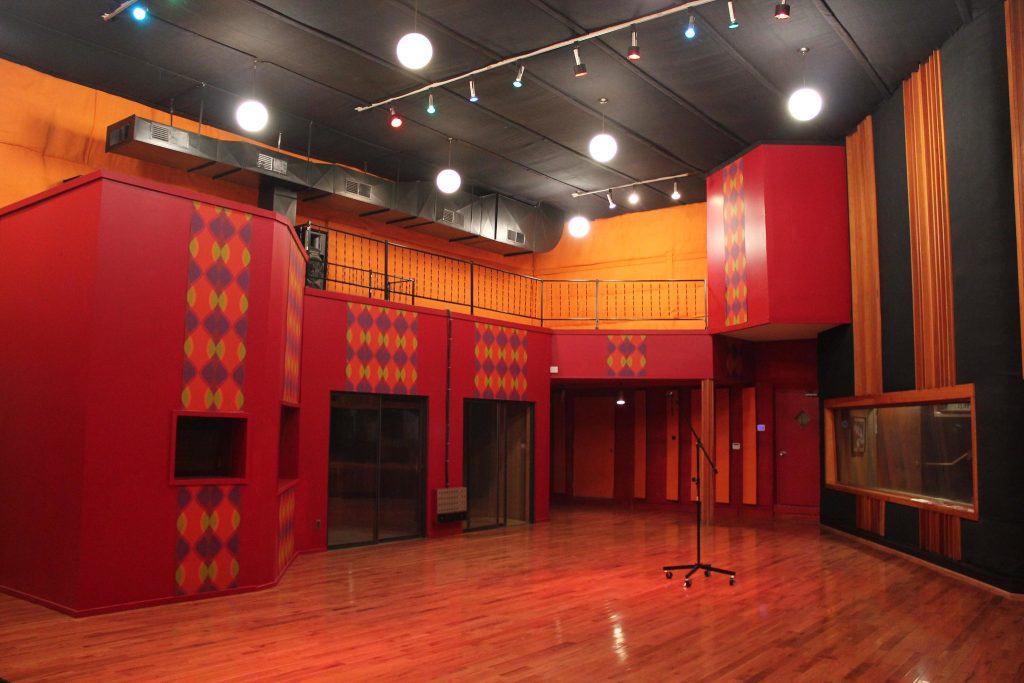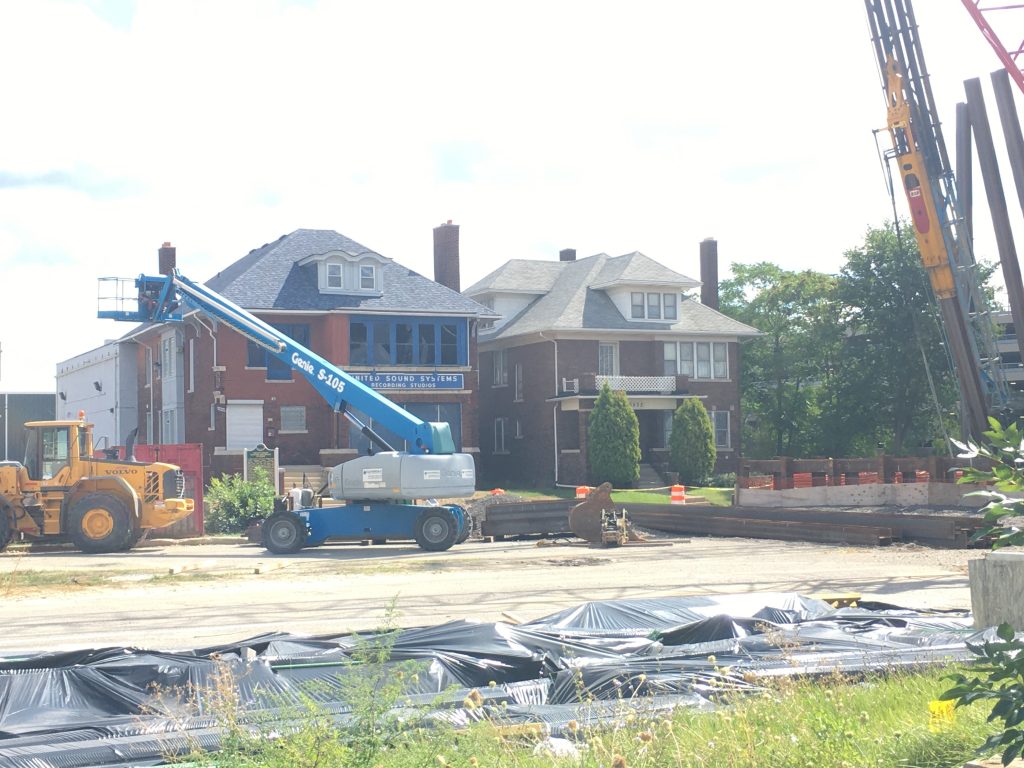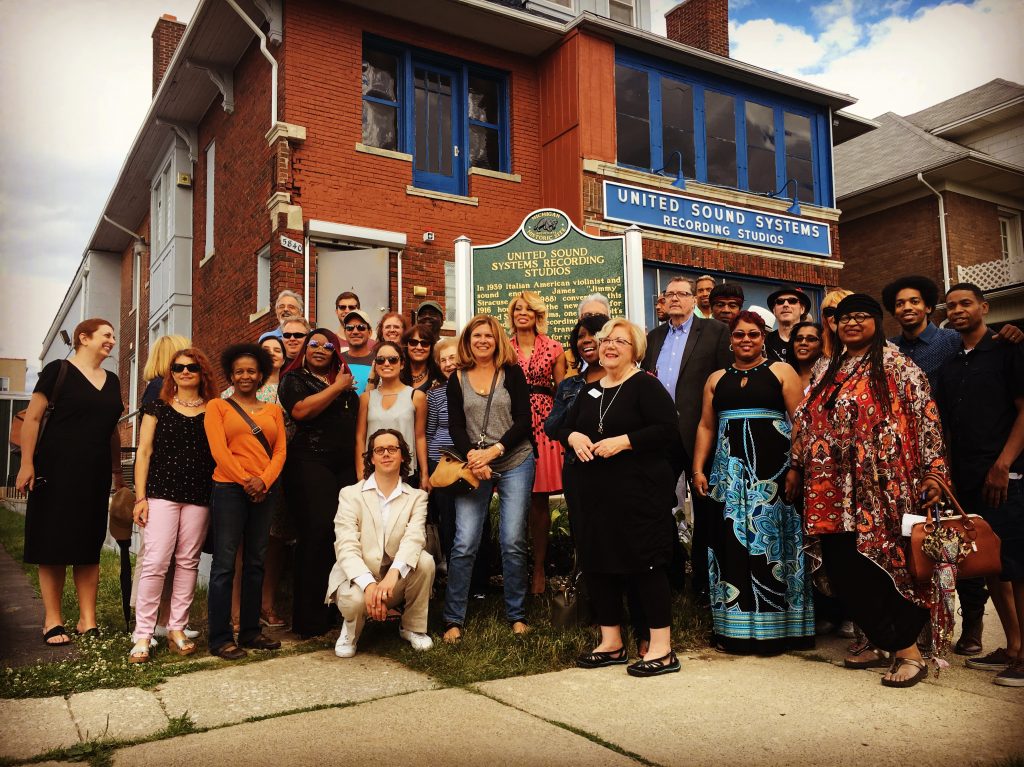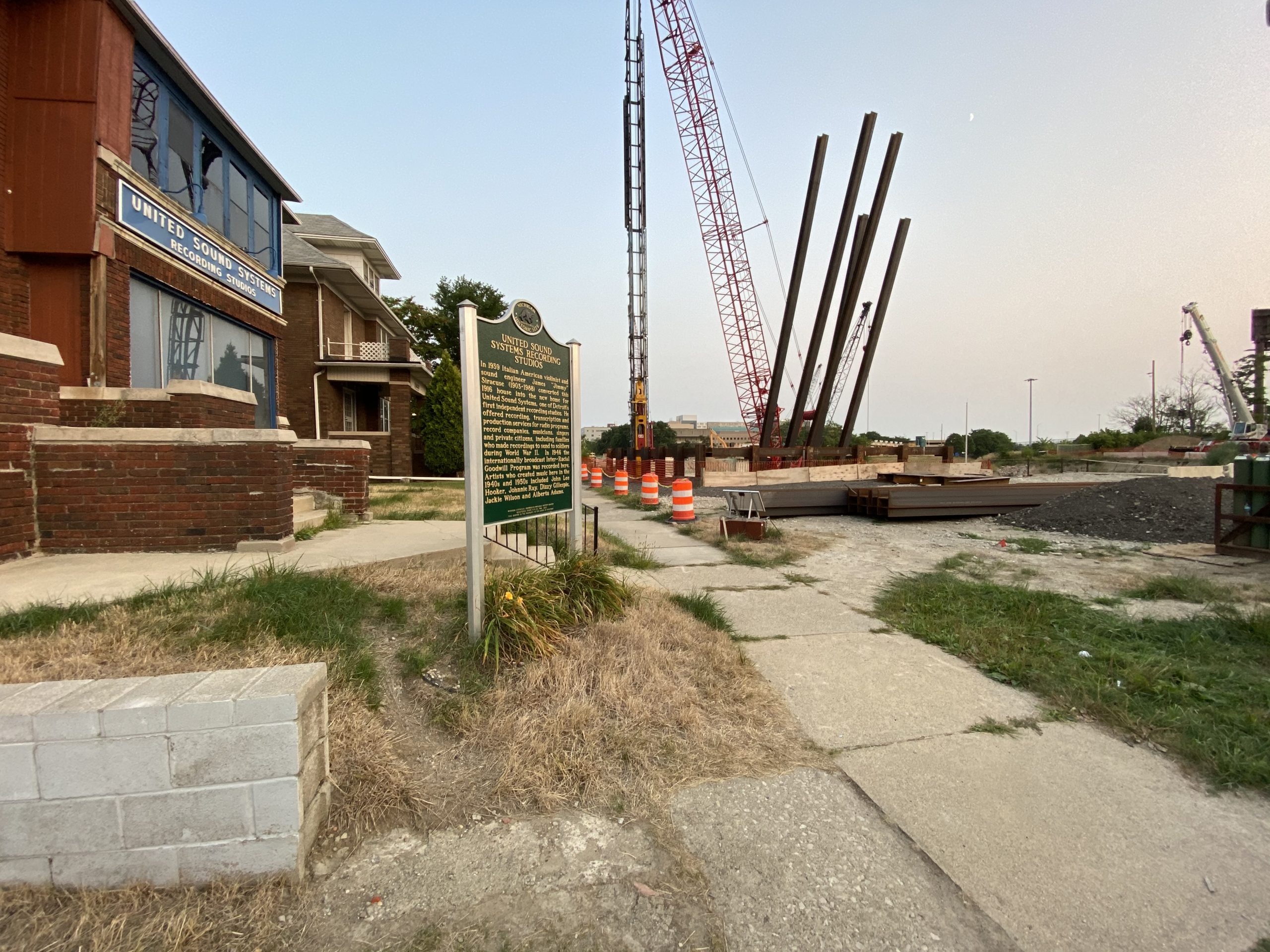An internationally significant Black historic site where world-altering music was recorded is to be put at risk for a highway service road. Is this OK?
This post was updated with more endorsements on December 18, 2020.
What Is At Stake
United Sound Systems Recording Studios, an internationally significant Black historic site, where world-altering music by some of the greatest artists in American history, including John Lee Hooker and Aretha Franklin, will be put at risk from irrevocable damage for a highway service road.
[For a list of just some of the multitude of performers, arrangers, engineers, songwriters, and producers that worked creatively at United Sound — from members of the Detroit Symphony Orchestra to the MC5 — click here.]
Is this OK?
Is a service road more important than our City’s world-renowned musical legacy? And if we decide it is, what does that decision say about our priorities as a city, state, and nation?
Is a service road more important than our City’s world-renowned musical legacy? And if we decide it is, what does that decision say about our priorities as a city, state, and nation?
A Reminder: Motown Started Here
Last year Motown Records celebrated 60 years. Motown’s first recordings were made at United Sound! [Listen to Marv Johnson‘s “Come To Me”]
Background: MDOT Owns United
Last year, Michigan’s Department of Transportation purchased United Sound so it could build a service road for I-94.
Our State Historians Think It’s OK
Now MDOT, with the permission of the Michigan Economic Development Corporation administered State Historic Preservation Office, has published an update of that commitment.

If We Move It, We May Lose It
Upon review, Detroit Sound Conservancy has many questions. These include:
— How will MDOT guarantee the structural integrity of the 100 year old original house, which has three different studios representing a series of ingenious adaptive reused spaces where not one detail, from ceiling tiles to the toilet bowl, were not used to timeless musical effect? [Listen to John Lee Hooker‘s “Boggie Chillen” recorded upstairs in the original house.]
— How will MDOT maintain the integrity and authenticity of Studio A, the large concrete block addition, with radiant heated floors, custom-made wooden booths for vocals, drums, and consoles, and echo chamber? Or will the structure be lost and need to be replaced? [Listen to Parliament‘s “Flash Light” recorded at United Sound.]
— How will MDOT maintain the building’s basement where historically its equipment was fixed, recording consoles were tweaked from below, and jukeboxes were repaired? Or will this structure, and the traces of this history, be lost and need to be replaced? [Listen to Aretha Franklin and Whitney Houston‘s “It Isn’t, It Wasn’t, It Ain’t Never Gonna Be” recorded at United Sound, Studio B.]
— And if the Emma A. Fox Home next door, historically significant in its own right for being the home of early feminist activist Emma Fox (1847-1945), is demolished, as is currently MDOT’s plan, how will MDOT guarantee that the studio will be able to conduct business as a recording studio? We believe this home is the only thing protecting United from noise generated by I-94 traffic.

Do we honestly believe that MDOT will preserve the capacity for sonic magic in these historically significant spaces?
Do we honestly believe that MDOT will preserve the capacity for sonic magic in these historically significant spaces?
Our conclusion is that, barring a set of structural engineering and historical preservation miracles, Detroiters and the world stand to lose much if United is moved or–in an outcome MDOT still refuses to rule out–is demolished.
And yes, you read that correctly: MDOT has still not ruled out the possibility of demolition.
And yes, you read that correctly: MDOT has still not ruled out the possibility of demolition.
So today, we invite Michigan residents and their elected representatives to ponder a fundamentally different approach: What is gained if this remarkable Black historic site and the Fox Home stay right where they are? What if United were to remain intact and authentically whole? Or what if their beloved service road was rerouted to the other side of I94? Surely a parking garage is not as significant as the site of Dizzy Gillespie‘s record label during the 1950s! What if instead of dedicating many hundreds of hours and many thousands (millions?) of dollars on a seemingly impossible set of tasks, MDOT decided to conduct the engagement and build the partnerships to determine what we want this temple to Black creative excellence–this Mothership–to be, now, for Detroit?
We Are Waiting For YOU
[Yes, United was also the site of a duet between Aretha Franklin and George Michael!]
To be clear: we are not calling for more public hearings. A public hearing is not community engagement. Instead, we are asking: when will the State of Michigan and its agencies convene the legitimate stakeholders of United’s legacy — the still living musicians, artists, producers, songwriters, and arrangers (and the estates of those now passed on) — to consider the future of United Sound Systems as a resonant, impactful, public good?
Now State of Michigan: Can you get to that?

Who’s a DSC?
Detroit Sound Conservancy is a nonprofit community-based archive presently located in New Center but soon to be located at the Legendary Blue Bird Inn on the City’s Old West Side. We are committed to preserving Detroit’s musical legacies through preservation, education, performance, and placekeeping. Over the last decade, we have led the fight to preserve and celebrate United Sound and have a track-record of in-depth, prolonged, resident engagement. As part of those efforts, we have supported a successful local Historic District process in 2016 and led the successful effort to place a Michigan Historical Marker at the studio in 2017. In addition, we have attended public hearings, commented at City Council meetings, interviewed United Sound veterans, conducted archaeological surveys, exhibited studio artifacts, informed politicians, attended closed-door meetings, and, most importantly, informed and advised the public as to what was at stake in the fight to preserve United Sound.
Media and United Legacy Contact
Carleton S. Gholz, PhD, Founder & Executive Director Emeritus, Detroit Sound Conservancy / gholz AT detroitsound.org / 440 Burroughs, Suite 195, Detroit, MI 48202, 313-757-5082.
Historical Marker Text
United Sound Systems Recording Studios: In 1939 Italian American violinist and sound engineer James “Jimmy” Siracuse (1903-1988) converted this 1916 house into the new home for United Sound Systems, one of Detroit’s first independent recording studios. He offered recording, transcription and production services for radio programs, record companies, musicians, singers and private citizens, including families who made recordings to send to soldiers during World War II. In 1946 the internationally broadcast Inter-Racial Goodwill Program was recorded here. Artists who created music here in the 1940s and 1950s included John Lee Hooker, Johnnie Ray, Dizzy Gillespie, Jackie Wilson and Alberta Adams.
United Sound Systems Recording Studios: James “Jimmy” Siracuse enlarged this studio to accommodate orchestras and motion picture production in 1956. Marv Johnson’s 1959 song “Come To Me,” recorded here, was the first single for Tamla Records (later Motown Records). African American guitarist, producer and entrepreneur Don Davis (1938-2014) bought the studio in 1972. He worked with new and established artists from all musical genres, but especially soul, disco, funk, and rhythm and blues. Among them was Johnnie Taylor. His 1976 song “Disco Lady” was the first single certified platinum by the Recording Industry Association of America. By the mid-2000s, United Sound had closed. It reopened in 2014.
Signed
DSC Board of Directors
Alex Alexander
Alexander is a former United Tour Guide.
Ralphe Armstrong
Armstrong is a bassist and Board Member of the Detroit Federation of Musicians.
Ben Beverly
Beverly is a Detroit-raised longtime music industry professional who also recorded at United with the band Enemy Squad.
James Carter
Carter is a jazz musician who made his recording debut at United at the age of 13.
Kiko Davis
Davis is the widow of former United Sound owner Don Davis and the Founder and President of the Don Davis Legacy Foundation.
“Detroit Soul Ambassador” Melvin Davis
Davis is a songwriter, musician, and recording artist.
The future should not be at the expense of our history.
Detroit Soul Ambassador Melvin Davis
“Detroit’s Queen of the Blues” Thornetta Davis
Davis recorded at United with George Clinton as well as a solo performer.
Samantha Ellens
Ellens is a local archaeologist who partnered with DSC to conduct a survey of United Sound Systems’ basement in 2016.
Peter J. Hammer
Hammer is a Professor of Law & Director of the Damon J. Keith Center for Civil Rights, Wayne State University Law School.
Joe “Pep” Harris
Harris is the frontman for The Undisputed Truth.
This seems to be such a shame that somebody has no knowledge of the culture and the real history that was such a boost to the artists, music, stage, and radio, not to mention the beginnings of Motown. I worked at United ten years for Don Davis. We worked with such people as Aretha Franklin, The Dramatics, The Undisputed Truth, The Red Hot Chili Peppers, Bootsy Collins, Anne Lennox, just to name a few.
Joe “Pep” Harris
Marion Hayden
Hayden is a jazz bassist and recording artist.
Maurice “Pirahnahead” Herd
Herd is a musician, arranger, and engineer.
Francies, Sandy, and Lindsey Herdon
Francies is the daughter, Sandy is the granddaughter, and Lindsey is the great-granddaughter of United Sound founder James Siracuse. Francies’ husband and Lindsey’s grandfather, William Herdon, was an engineer at the studio.
Zakiya Hooker
Hooker is the daughter of blues legend John Lee Hooker.
Karen Hudson Samuels
Hudson Samuels is Executive Director of the WGPR TV Historical Society and Chair of the Black Historic Sites Committee.
McKinley Jackson
Jackson is a musician, songwriter, recording artist, and Funk Brother who spent many hours making music at United.
Kimberly S. Johnson
John is an arts consultant and historic preservation specialist.
Jeff Kollath
Kollath is the Executive Director of the Stax Museum of American Soul Music in Memphis.
Samantha Mecca
Mecca is an historian and Professor of Dance and Music at The University of Michigan. She is currently writing a book entitled, Detroit’s Lost Soul: The Story of Holland-Dozier-Holland’s Invictus and Hot Wax Records and a City’s Erased Legacy.
Estate of Charlie Parker
Parker, saxophonist and composer, was a titan of 20th century music. He recorded at United Sound Systems with Miles Davis in 1947.
Jeremy Peters, FRSA
Peters is Assistant Professor of Music (Music Business) at Wayne State University.
Preservation Detroit
Preservation Detroit strives to create a Detroit where cultural, architectural, and community preservation is integrated into every aspect of the city’s development.
Claudette Robinson
Robinson is the “First Lady of Motown” and an original member of the Miracles.
We, the Miracles, recorded our very first record “Got a Job” at United Sound even though it was leased to the End Record Label because Motown hadn’t started! UNITED SOUND STUDIOS is ICONIC and has MAJOR HISTORY! Save UNITED SOUND STUDIOS.
Claudette Robinson, The First Lady of Motown
Matt Ross-Spang
Ross-Spang is a Grammy award winning engineer, mixer, and producer with extensive experience at historic studios such as Sun in Memphis.
Nick Schroeck
Schroeck is an Associate Dean at University of Detroit Mercy and a longtime adviser regarding the I94 Project and United Sound Systems.
Paul Schauert
Schauert is a Assistant Professor of Integrated Arts and Humanities at Michigan State University.
Mary Sheffield
Sheffield is the Councilperson for District 5 in Detroit where United Sound Systems is located.
United Sound Systems Recording Studios is a part of Detroit’s history. This valuable venue holds the history of what helped make Detroit great. It is home to legendary performers whose music has enriched and shaped American culture so profoundly, their contributions are still being felt today. Although expanding I-94 would greatly benefit Detroiters and everyone who will use this stretch of highway, I hope we can find a way to expand and improve the road in a way that does not spell the end of United Sound Systems Recording Studios. If it is economically feasible, it is my hope we can keep this building intact, at its current location, while still moving forward with I-94 construction. Supporting our local history should be a priority in Detroit.
Mary Sheffield, Council President Pro-Tem, City of Detroit
Ron Skinner
Skinner is a producer and recording engineer at CBC Music.
United Sound Systems may be the single most important historic recording studio in the United States. It is a miracle that it has stood for as long as it has, and I don’t believe that something as insignificant as a highway service road should jeopardize this incredible building. One example of United Sound’s importance is that it may well be the only studio still standing where the great Charlie Parker recorded. And that is just one of hundreds of examples of the importance of this facility. There is no other facility still standing in the United States where future recording engineers and producers can step into an acoustic environment that has such a broad and rich history. Moving the building will jeopardize the integrity of the space and tearing it down would be a sin.
Ron Skinner, CBC Music
Patricia Terry-Ross
Terry-Ross is a 2017 Kresge Eminent Artist and recorded at United Sound.
George Troia, Jr.
Troia is the President of the Detroit Federation of Musicians, Local 5.
United Sound Systems is an integral part of Detroit’s contemporary music history. It was a model for Motown and was the site of numerous recordings over the decades. I say this not only as active studio musician who worked there but also as the current President of the Detroit Federation of Musicians, AFM Local 5.
George Troia, Jr.
Ed Wolfrum
Wolfrum was a longtime recording engineer at United Sound Systems.


Alex Alexander
Having been apart of United Sound System since 1988, I found the history of this space to be one of a kind and those who worked from within it should be here to support that it lives on as a still active place to create music
Marsha Music
In the late 1940’s my father, record man Joe Von Battle, took John Lee Hooker, and other Blues artists, to United Sound to record.
This is an historic place, integral to Detroit’s famed musical legacy. I urge a reconsideration of plans to move this structure, an action that might put this seminal space at risk.
I appeal to your good offices in this matter, that there not be a repeat of irreparable errors made in the past.
THORNETTA DAVIS
United sounds was one of the first studios ever recorded in. I have memories of meeting George Clinton there for the first time singing background for him with my group Chanteuse. Don Davis would hire us to come in and perform background for different artists that he was working with. My most recent recording there was for my latest CD Honest Woman. I had invited over 50 woman who inspire me to come in sing background on my song “Sister friends indeed” https://youtu.be/O6MP6HP3Az8
I feel so blessed to be able to be a part of the history of United Sounds recording studio.
Martin Tino Gross
I first became aware of United Sound during recording sessions in the early ’90s with my band, the Howling Diablos. Steve King was our engineer and we recorded several albums there, using it as our home base studio. Don Davis would drop in, listen to our stuff, make suggestions, and eventually started to work with us, helping us gain exposure. I had a few incredible experiences there with George Clinton as well. One day the Black Crowes came by our session so they too could check out the historic United Sound. The big Neve board was personally installed by Rupert Neve, and that sound was incredible. I love United Sound, it is a cornerstone of Detroit Music History, and should be treated as such.
Martone
This gem of musical history must be preserved.
Todd Scott
MDOT is no longer building a service drive here. They have committed to moving the building one parcel to the north, building a new basement, and repairing any structural damage. It’s all spelled out in this document. https://i94detroit.org/wp-content/uploads/FSEIS-ROD/Appendix_D-Section_106_Documents.pdf
csgholz
Thanks Todd for your comment. Briefly: We are aware of MDOT’s proposed plans and have read all the documents. That’s why we have written our statement which we stand by. The statement is about whether or not Detroit residents, especially those who are a part of United’s historic legacy, are OK with these plans and their risks. Our Board and our allies are not.
Adam White
As one of many non-American citizens with a long, deep attachment to Detroit, it’s inconceivable to me that the MDOT would consider undermining a piece of the city’s history in this manner. Around the world, musicologists (and music fans) beyond measure are fully aware of United Sound’s importance to the birth of Motown Records. And Motown Records is Detroit’s single most significant contribution to popular culture, worldwide. Is this considered of no value, compared to road construction? Please reconsider, and demonstrate your understanding of United’s contribution to the history of your city, your state, and your country.
Stefan Weil
Detroit is Music. There is no other city in the world that has such a magic connection to music. Nearby all genres, ranging from Rock, Hip Hop, Funk, Soul, Techno, Electro … Suzy Quatro, The Stooges, Alice Cooper, Motown, Eminem, The White Stripes, UR, Carl Craig, Jeff Mills … the variety is awesome, amazing and a myth. Every place that saves the legacy of Detroit for generations to come must stay. And as we all know the original place on earth has a spiritual value. I will never forget the moment when i was listening to my own voice in the echo chamber in the blue Hitsville House. Please beware the myth, beware the magic, beware this tiny little house that was so important for music. For Detroit and for the world. Nothing else matters.